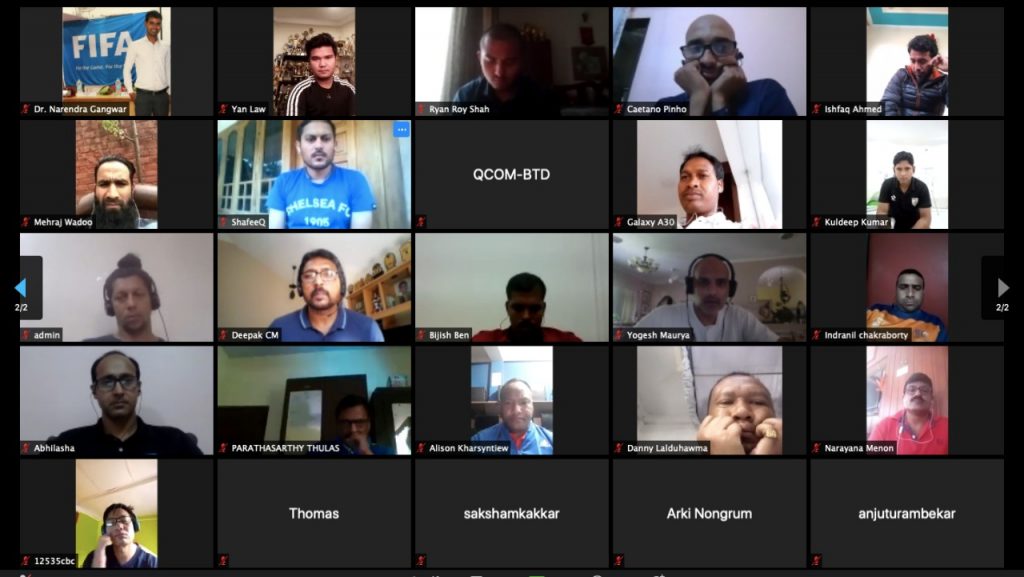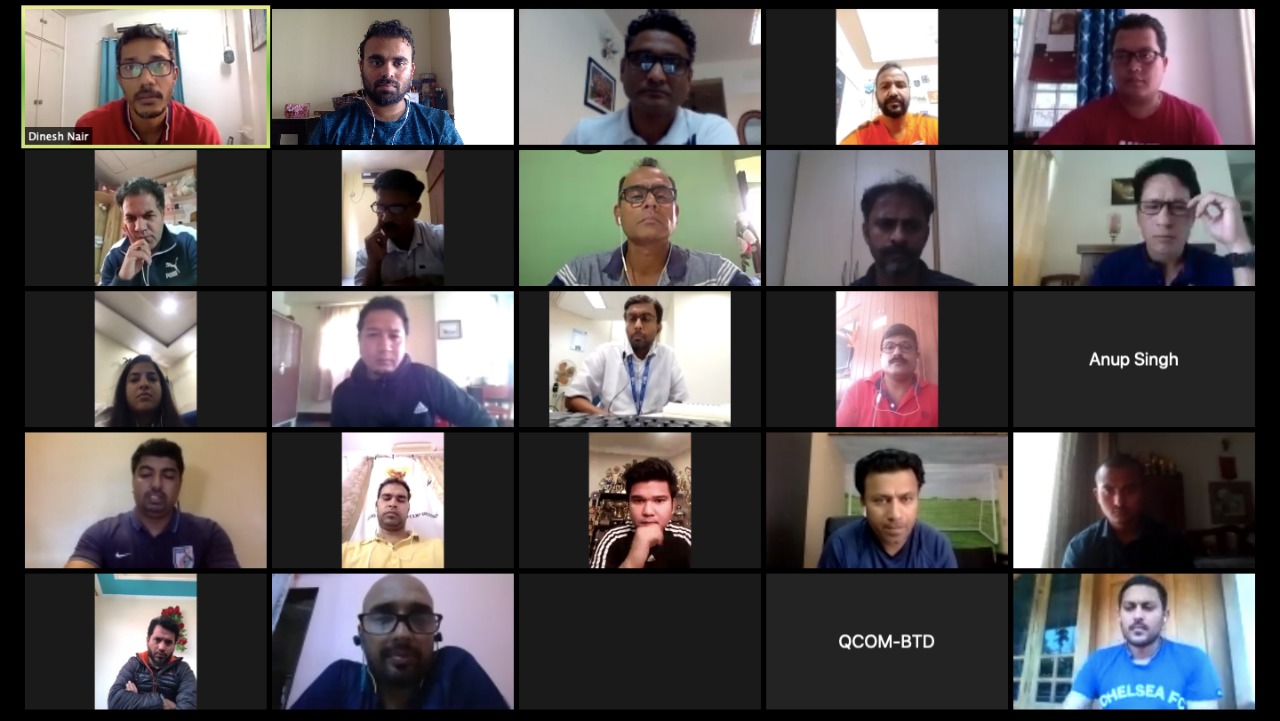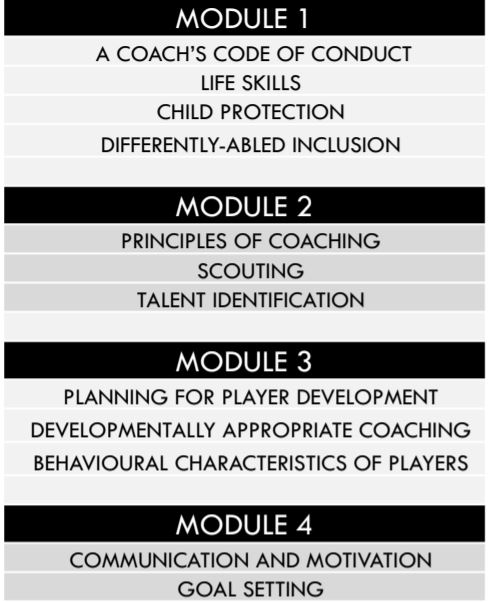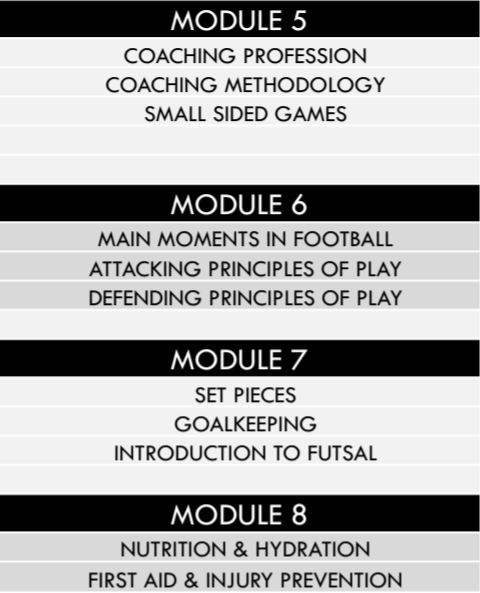Association of Indian Football Coaches (AIFC) is set to kick-start a Webinar in Football Coaching. It will be held in 23 states across the country.
This initiative from AIFC comes in the wake of the current scenario of the Coronavirus pandemic. The country which has been in a lock-down for three weeks already, is expected to be extended. Due to this, all sporting activities amongst others are at a standstill.
The AIFC Webinar is an opportunity for Indian football coaches to continue learning from the comforts of their homes. This will also help them stay connected with fellow-coaches and also brush up their knowledge of the sport.
The webinar comprises of eight modules and it will be held between 15th April to 8th May 2020. Below are the topics under each module:
Talking further on this initiative, AIFF Head of Coach Education, Savio Medeira said,
“Every initiative has got a value. AIFC has come out with a great idea in the form of webinar, which will keep the coaches and the tutors engaged for some time and at the same time get mentally refreshed during this lock-down period. Wish AIFC and all tutors a great time of knowledge sharing.”
This initiative has been lauded by the Instructors/Educators and also AIFC Core Team members. They were addressed and informed as to specialization of their roles through video conference earlier today.

Coaches/Educators via video conference discussed further proceedings of the Webinar
AIFF Instructor and AIFC Core Team Member Shakti Chauhan said that the initiative will be beneficial to the coaches across these states.
“Due to the unfortunate situation of lock-down in India because of Covid-19 Virus, the coaches and players are not able to go on the field to train and play. But as all of us know that ‘Learning is a Continues Process’ and so this AIFC Webinar will give the Indian coaches and players an opportunity to keep themselves connected to the game and refresh their knowledge of the game through Expert Football Coaches & Educators,” he said.
The following are the states where the webinar will be conducted through video conferencing:
Goa, Punjab, Kerala, Karnataka, Tamil Nadu, West Bengal, Meghalaya, Mizoram, Manipur, Assam, Arunachal Pradesh, Odisha, Jharkhand, Andhra Pradesh, Telangana, Delhi, Gujarat, Rajasthan, Jammu & Kashmir, Madhya Pradesh, Maharashtra, Himachal Pradesh, Uttar Pradesh.
Eligibility criteria: The webinar is for licensed coaches, school PE teachers, coaches from clubs, academies, NGO’s, other institutions. Please note, there are limited seats, therefore as soon as the list of coordinators are released, do register with them.
*Age criteria – 18 years & above only
Participants will have to abide by the AIFC Webinar Code of Conduct as provided by the Webinar coordinators
On 14th April, there will be digital training session held for the Coordinators. The list of the coordinators from respective states will be released thereafter.







Seemala sudarshan reddy
13 Apr 2020I am ready to join
Tarique naeem
13 Apr 2020Good work……..All coahes……
CJames panmei
13 Apr 2020Thanks it’s an honor to be aifc member
shyam manik Lodh
13 Apr 2020It is a very good opportunity specialty young coaches will get learning platform. Great initiative by AIFC. My best wishes.
Preetam Mamani
13 Apr 2020Dear sir.
I would like to be a part of this webinar. Since it looks like a once ina lifetime opportunity to find so many experts coming together to share their knowledge.
Please let me know how I can go thru with this as I’m not a licensed coach.
Regards
Preetam Mamani
Nandakumar
13 Apr 2020Good initiative, I want to join.
Jerin
13 Apr 2020Thank you so much for the update
Angtong Teron
13 Apr 2020Sir, is the webinar programme only for registered coaches ? As i have not yet appeared for the D licence course, can i still register with the coordinator ?
aifc-admin
14 Apr 2020Yes you can
John Gomes
13 Apr 2020Great initiative. thank you very much
Rajat Sharma
13 Apr 2020Good work AIFC I Really Appreciate your work. Great
Amrita Das
13 Apr 2020Great idia
Vinoth
13 Apr 2020Dear sir / madam
To AIFC
As I am vinoth from KGF and I had done my D LICENCE and I had running my own club CHAMPION REEF FOOTBALL CLUB , started coaching students , i am looking forward Learning more on coaching so please help to enroll me I am sharing my number 7795580919 please do the needful
Thanks and regards
Vinoth
ROOPESH CIRUVILLA
13 Apr 2020Hi
I’m ROOPESH from Bangalore, Karnataka, I’m interested in this webinar
I’m Football coach with AIFF D LICENSE, WORKED IN BARCA ACADEMY BENGALURU, Byfl , presently working with stadium soccer & Laliga football schools
Virender Singh
13 Apr 2020hey I am Virender Singh from delhi. Want to know about How I can join this webinar. And how I can connect with my states cordinator.
aifc-admin
14 Apr 2020https://www.the-aifc.com/blog/list-of-coordinators-released-participants-to-register-with-them/ All details here.
Devavrat Redkar
14 Apr 2020Hi Myself Devavrat Redkar I have completely my AFC C license course and is interested in the course. You can contact me on 9892520012 Thank you looking forward for the course.
Khokan Sardar
14 Apr 2020”Learn From Home”
Very good decision actually now needed this type of education process.
Thanku AIFC.
Umer Mutawalli
14 Apr 2020I am interested
Majid Hasan
14 Apr 2020I also want to join
Teresa Dsouza
14 Apr 2020I m interested. That’s great.
Kamlesh Maradiya
14 Apr 2020I want to participate
Amardeep Kundale
14 Apr 2020Good Initiative.
Team AIFC & AIFF.
Plz let us inform How to Register & Join this Unique activity.
Thank you.
Chandi das
14 Apr 2020Excellent idea,I want to participate
Shabir reshI
14 Apr 2020Amazing step
Hats off to aifc
Shabir reshI
14 Apr 2020Amazing step
Hats off to aifc..
I want to be part of it.
Sangey Tsering
14 Apr 2020Thanks for the initiative. I am in.✌️
Samiran Roy
14 Apr 2020Well done AIFC ⚽️❤🇮🇳🙏✌
Madhav Gope
14 Apr 2020I agree
Madhav Gope
14 Apr 2020I also want to join
Aamir Nazir
14 Apr 2020A good development step for Coaches behalf of AIFC.
Abhishek
14 Apr 2020Would like to join the webinar.
P. K. Mohanty
14 Apr 2020Great initiative by aiff. I want to be a part of it.
P. K. Mohanty
14 Apr 2020Great initiative by AIFC. I want to be a part of it.
Lakkhi kumar Ghogra
14 Apr 2020Coaches have good steps to improve in coaching.
MIRZA ALI IMRAN
14 Apr 2020I also want to join becoz it is good developmental step for coaches and players
MIRZA ALI IMRAN
14 Apr 2020Its good step for development of football education for coaches and players
Tongminthang Haokip
25 Jun 2020Dear sir. I want to be a part in it. That i can improve my coaching career
Allenmob
20 Aug 2024Your comment is awaiting moderation.
Philosophy is the discipline that studies fundamental and universal questions, such as existence, cognition, values, mind, and language. It covers a vast number of topics and problems, ranging from ethics and political figures to metaphysics and logic. Here are the main nuances of philosophy:
1. Definition of Philosophy
Philosophy comes from the Greek words “philos” (love) and “sophia” (wisdom). It is the desire to understand and make sense of the world around us and our place in it.
2. The Main branches of philosophy
– Ontology the study of the essence of being and existence.
– Epistemology the study of the nature and limits of knowledge.
– Ethics the analysis of ethical principles and concepts of good and evil.
– Logic research of the forms and principles of correct thinking.
– Socio-political philosophy the study of questions of power, justice and the state.
3. Famous Philosophers
Throughout the history of philosophy, almost many thinkers have made meaningful contributions to this science. Some of the most recognizable include:
– Socrates, considered the founder of Western philosophy.
– Plato, a student of Socrates, developed the doctrine of forms.
– Aristotle, the creator of logic and a large number of scientific fields.
– Immanuel Kant, known for his own Philosophy critical philosophy and work on moral issues.
4. The Relevance of Philosophy in the Modern World
Philosophy remains relevant in the modern world as enables people to understand difficult social and ethical issues, but also develops critical thinking. It influences the legal system, politicians, and different fields of science.
5. Practical Applications of Philosophy
Philosophical ideas penetrate daily life. Ethical reflection helps people do the right thing in complex situations, and philosophical analysis contributes to best understanding of issues related to technology, art, and social justice.
Philosophy is not only an academic discipline, but also method of thinking assists us to understand life’s complexities and make informed choices.
Allenmob
20 Aug 2024Your comment is awaiting moderation.
Philosophy is the discipline that studies major and universal questions, including existence, knowledge, values, mind, and language. It encompasses a vast number of subjects and issues, ranging from ethics and politicians to metaphysics and logic. Here are principal nuances of philosophy:
1. Definition of Philosophy
Philosophy comes from the Greek words “philos” (love) and “sophia” (wisdom). It is zeal to understand and make sense of the world around us and our place in it.
2. The Main branches of philosophy
– Ontology the study of the essence of being and existence.
– Epistemology the study of the nature and limits of knowledge.
– Ethics the analysis of moral principles and concepts of good deed and evil.
– Logic the study of the forms and principles of correct thinking.
– Political philosophy the study of questions of power, justice and the state.
3. Notable Philosophers
In the course of the history of philosophy, many thinkers have made meaningful contributions to this science. Some of the most famous include:
– Socrates, considered the progenitor of Western philosophy.
– Plato, a pupil of Socrates, developed the doctrine of forms.
– Aristotle, the creator of logic and a large number of scientific fields.
– Immanuel Kant, known for his own James Joyce critical philosophy and work on moral issues.
4. The Relevance of Philosophy in the Modern World
Philosophy remains relevant in the modern world because it helps people to understand difficult social and moral issues, also develops critical thinking. It influences the legal system, politicians, and various fields of science.
5. Practical Applications of Philosophy
Philosophical ideas penetrate everyday life. Ethical reflection helps people do the correct thing in complex situations, and philosophical analysis contributes to greatest understanding of issues related to technology, art, and social justice.
Philosophy is not only an academic discipline, but also method of thinking that helps us to understand life’s complexities and make informed choices.
Allenmob
21 Aug 2024Your comment is awaiting moderation.
Philosophy is the discipline that studies major and universal questions, including existence, knowledge, values, mind, and language. It encompasses many subjects and problems, ranging from ethics and political figures to metaphysics and logic. Here are the main aspects of philosophy:
1. Definition of Philosophy
Philosophy comes from the Greek words “philos” (love) and “sophia” (wisdom). It is the desire to realize and make sense of the world around us and our place in it.
2. The Main branches of philosophy
– Ontology the study of the essence of being and existence.
– Epistemology the study of the nature and limits of knowledge.
– Ethics the analysis of moral principles and concepts of good deed and evil.
– Logic research of the forms and principles of correct thinking.
– Political philosophy the study of questions of power, justice and the state.
3. Famous Philosophers
During the history of philosophy, many thinkers have made meaningful contributions to this science. Some of the most recognizable include:
– Socrates, considered the founder of Western philosophy.
– Plato, a student of Socrates, developed the doctrine of forms.
– Aristotle, the creator of logic and many of scientific fields.
– Immanuel Kant, known for his Henry Miller critical philosophy and work on moral issues.
4. The Relevance of Philosophy in the Modern World
Philosophy remains relevant in the modern world since enables people to understand complex social and moral issues, and also develops critical thinking. It influences the legal system, politicians, and different fields of science.
5. Practical Applications of Philosophy
Philosophical ideas penetrate daily life. Ethical reflection helps people do the correct thing in difficult situations, and philosophical analysis contributes to best understanding of issues related to technology, art, and social justice.
Philosophy is not only an academic discipline, as well as method of thinking assists us to understand life’s complexities and make informed choices.